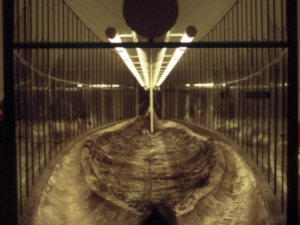Neither the Sanhedrin nor King Herod, but only Pontius Pilate, could pass judgment over Yehoshua son of Miriam and Joseph. He had inherited Roman citizenship from his father, which was one of the reasons that they could travel freely within the Roman empire (on Roman roads).
 Notice that Yehoshua was sentenced for “claiming kingship” and not for blasphemy. If he had been a citizen of Judea or a subject to the Temple-law, he would have been killed by either the Sanhedrin or Herod.
Notice that Yehoshua was sentenced for “claiming kingship” and not for blasphemy. If he had been a citizen of Judea or a subject to the Temple-law, he would have been killed by either the Sanhedrin or Herod.
Even if he would have claimed kingship over Judea, being Judean citizen, that would not have sufficed for Pilate to condemn him, for claiming kingship as a feudal-king within an occupied province was not in itself a capital crime against the Roman empire.
On the other hand, for any Roman Citizen, claiming any kind of kingship anywhere at all, was a capital crime against the emperor, and before that a crime against the Senate.
Another key element to this understanding is the fact that Augustus the emperor of Rome, at the birth of Jesus, declared that roman citizens throughout the empire had to register themselves and redeclare their claim of citizenship in Rome. Subjects of provinces outside Rome were not expected to be indexed and register at all within that legal framework. That’s why Joseph – or Yusuf – went to register himself, for he was, just like Saul from Tarsus, a Roman Jew.
Notice in this respect an explanation on this legal matter, published on “wol.jw.org” of the Watchtower society regarding Saul from Tarsus, better known as The Apostle Paul:
“Tell me, are you a Roman?” He said: “Yes.”—Acts 22:27.
Roman citizenship offered valuable rights and immunities. Paul made use of his Roman citizenship on several occasions. Faced with scourging in Jerusalem, the apostle asked a Roman officer: “Is it lawful for you to scourge a Roman who has not been condemned?” It was not. When Paul pointed out that he was a Roman citizen by birth, “the men who were about to interrogate him under torture backed away from him; and the military commander became afraid.” (Acts 22:25-29) Paul’s citizenship under Roman law affected how he was treated in Philippi. (Acts 16:35-40) In Ephesus, the city recorder referred to the Roman legal system after he had calmed an angry mob. (Acts 19:35-41) Paul’s legal appeal while in Caesarea opened the way for him to make a defense of his faith before Caesar. (Acts 25:8-12) Thus, Roman law made possible “the defending and legally establishing of the good news.”—Phil. 1:7. w15 2/15 3:13, 14
~copied from wol.jw.org
I explained this situation in my book “Logostal on Biblical understanding” which still only exists in Icelandic as “Orðatal, af leyndardómum Biblíunnar.” As far as I know, there has been no public understanding of these matters in Christian theology through the centuries.
Interesting as it may be, sometimes the simplest explanations are right in front of us all the time and once we see, we are dumbfounded that we didn’t see them earlier. Yet, the most interesting of all mysteries is this; if theologians, laymen, or prophets before my time have discovered this, most of all; if the Freemasons in the time of Constantin the great knew this, then why is it so important to them to make sure that people don’t see it?
